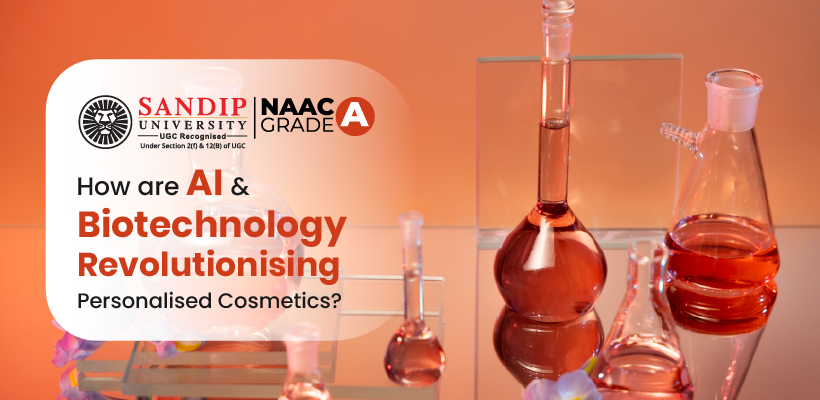A new era of skin care is personalised skin care and makeup. People nowadays are preferring personalised skin and hair care rather than opting for generic forms, they feel that personalising will help them get the best result possible. It helps consumers with the knowledge, efficiency, and transparency in what they are getting. This technology is getting popular as it is capable of solving very specific problems with accuracy. Some of the top beauty cosmetology colleges in Nashik are training students to understand the role of AI and biotechnology in the cosmetic industry.
Let us explore the revolution in personalised cosmetics led by AI and biotechnology:
Ways that AI and Biochemistry are changing the face of skincare-
1. Diagnostic and skin analysis using AI
Diagnosis, skin analysis and a few recommendations for skin and sometimes hair treatment just by uploading selfies and scanning face or scalp into an AI application.
Brands like Neutrogena, Olay and even Nyaka and using AI to match the consumer with personalised recommendations for skin and hair care, even makeup, most importantly proper shade of foundation and lipsticks. It helps the consumers to try on the product figuratively through AI.
2. Product Customisation
Some brands use AI to personalise and sort formulation using a database where customers can fill in specifications that will help to create a unique formulation for their particular needs. For example, creating a perfect shade of foundation or a perfect share of lipstick or a skin and hair care kit for specific needs of the consumers.
3. AI in Product Development
Ingredient Analysis: AI algorithms can predict which ingredients work best together, enhancing the efficacy of skincare formulations.
Consumer Insights: AI can analyse large datasets of consumer feedback and reviews to identify emerging skincare trends or common concerns, helping brands create products that truly address consumer needs.
Efficiency in Testing: AI can simulate testing environments to evaluate the effectiveness of products in a fraction of the time it would take in traditional laboratory settings, speeding up product development.
The Biotechnology Approach
Use of biotechnology can be used to make and develop safe, effective, and sustainable cosmetic ingredients and products few examples are:
1. DNA- analysis for skin and hair help prediction: Genetic testing can be done to determine future skin and hair problems. And certain precautions and treatments can make hyper-personalisation of skin and hair care that can help reduce the impact that is genetic.
2. Microbiome-Friendly personal care: A proper lab grown microbiome can play an important role in skin health. Diseases like eczema, rosacea, acne sensitivity, and irritation can be caused due to imbalanced skin microbiome. If done safely it can be beneficial for balancing and protecting skin and the hair.
3. Lab-Grown Ingredients: things like plant cell culture can be used to create rare ingredients in the lab and can save on cost and promote sustainability. Therefore you get a pure, strong biodegradable and sustainable bioengineered ingredient rather than synthetic or animal derived.
The Rising Demand for Personalised Cosmetics
Gen Z – the personal care industry is going digitally forward and Gen-Z being digitally forward is inclined to use these AI platforms and tools. However it misses the personal touch and also sometimes can lack authenticity. But there is a way to find a middle ground by adding or integrating with real people like dermatologists and other skin and hair care experts instead of using pure algorithms that will help with the personal touch and will also help maintain authenticity.
Up till now all the above mentioned things people have at least heard of but there has been a new revolution by introducing wearable beauty devices. For example bright rings and UV trackers that can be sun exposure and provide feedback for better results.
Another amazing tool is 3D printed makeup and nail art. People can customise makeup look shades and designs when it comes to both skin and nail art.
With all the glamour comes in a few issues and hurdles. First and foremost is high development cost, creating these AI based beauty products needs a large amount of investment which can discourage innovators from its usage. Second is privacy concerns collection of personal data can be a concern for data privacy that can make consumers vary. Lastly, introducing completely different concepts can be difficult to integrate. All these issues need sincere pondering and eventual solutions.
Conclusion
As we peek into the future, AI- biotech’s cutting edge technology will transform the entire beauty industry as never before. Programs like B.Sc. Beauty Cosmetology are designed to make students aware of the AI revolution in the cosmetic industry. We predict future advancement in AI and Augmented Reality (AR). And will turn this experience into a more personalised and integrated beauty experience combining beauty and wellness. Consumers will no longer need to guess which product works best for them; and AI will determine the exact needs and preferences which will change the whole perspective of purchase and use in the beauty industry.

